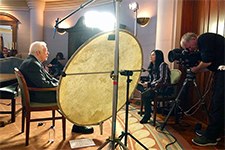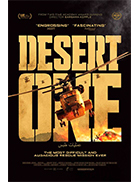Desert One
|  Prolific documentarian Barbara Kopple’s Desert One recounts the events surrounding the failed rescue mission of American hostages in Iran in early 1980, a painful moment of national failure that felt particularly devastating in the midst of the immediate post-Vietnam American malaise. Fifty-two Americans—mostly diplomatic staff and military guards—were being held hostage at the American Embassy in Tehran, having been captured during the Iranian Revolution on November 4, 1979. At the time of the attempted mission, they had been held for five and a half months, and all attempts at diplomacy, which was President Jimmy Carter’s preferred method, had been fruitless. There was growing pressure on Carter to secure their release, so he greenlit plans for a secret rescue operation that involved a team of Delta soldiers staging in the desert outside Tehran and then storming the embassy. The soldiers, as it turned out, never made it that far, as a series of debacles left eight American servicemen dead and multiple planes and helicopters destroyed. It was a momentous failure, one that historians have pinned on a perfect storm of technical malfunctions, flawed planning, and bad weather. Kopple’s documentary digs deep into the details of the mission, known as “Operation Eagle Claw,” bringing us into the planning and its attempted execution through archival photographs, telephone recordings, and animated sequences that depict what no cameras were present to capture in the desert. This aspect of the documentary has the tension of a good thriller, as Kopple layers detail upon detail of how this extraordinarily complex plan was assembled in a relatively short period of time by men who had no precedents on which to build; they were literally making it up as they went, inventing methods that had never been tested or used. Even if you know where it is all going, it is hard not to feel the pressure and suspense as the pieces start coming together and the special operations forces begin staging in the desert. Yet, what makes the film really work is the humanity that Kopple draws out of the narrative. This is not just the recounting of a failed military operation and its political aftermath, but rather a portrait of a large group of Americans committed to saving the lives of their imprisoned fellow countrymen and the Iranians who were holding them hostage. Even though the film leans heavily on the American side of the story, Kopple gives us pointed insight into the experiences of the Iranians, including Faizeh Moslehi and Hossein Sheikholeslam, two of the hostage takers who were university students at the time, and Mahmoud Abedini, who was an 11-year-old boy who had the misfortune of being on a bus with 44 of his friends and family that happened upon the mission as it was being staged and ended up bearing witness to the catastrophe. Kopple secured interviews with virtually all of the major players involved in the planning and execution of Operation Eagle Claw, which is testament to her immense stature as a documentarian of the American experience (she has won two Oscars, one for 1976’s Harlan County U.S.A., her directorial debut about a Kentucky coal miner strike, and 1991’s American Dream, about a Minnesota food worker strike) and the thoroughness with which she practices her craft. From the military’s perspective, we hear from more than a dozen commanders who were intimately involved in the mission, as well as several of their wives and now grown children who relate their experiences of living with a husband or father who one day might come home, pack a bag, say that he is leaving and having no idea if and when he would come back. She captures moments of raw emotion as the men recount the loss of their fellow soldiers, which puts a striking human face on a mission that has been long been shrouded in mystery. Kopple laces the interviews with archival footage and photographs, some of which have never been seen before. We see news footage, archival interviews, and at times difficult-to-watch images of the Iranians with burned American corpses, which drives home with stark acuity the pain of this failure and how it played into the hands of the newly installed Iranian government under Ayatollah Khomeini. And, at the risk of injecting current politics into my assessment of Kopple’s film, I can’t help but note how striking it was to watch footage of Carter, clearly distressed and emotional, holding a press conference the morning after the failed message and saying, “It was my decision to attempt the rescue operation. It was my decision to cancel it. The responsibility is fully my own.” Say what you will about Carter, whose Presidency was far from perfect, but he demonstrated in this perilous time what real leadership looks like—and, as it turned out, it cost him the election to Ronald Reagan, who was ready to seize on the moment. The tragedy of that time hangs heavy over Kopple’s film, which ends appropriately enough with a listing of the American servicemen who lost their lives in the failed mission and all of whom, as Carter points out in his interview, were volunteers. In a time when there is so much uncertainty about the direction and leadership of the United States, it is painfully ironic that we have to look back several decades to a massive military failure to see what real leadership and sacrifice looks like. Copyright © 2020 James Kendrick Thoughts? E-mail James Kendrick All images copyright © Greenwich Entertainment |
Overall Rating: 


 (3.5)
(3.5)


